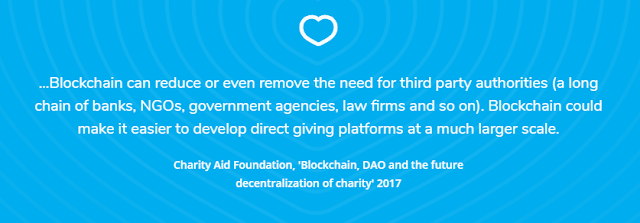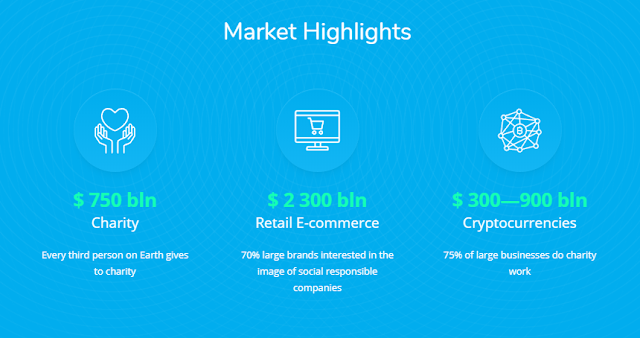Humancoin Review
The
Humancoin platform
Humancoin is a P2P platform and ecosystem that brings
together donors, recipients and e-commerce players. The platform's interface
lets participants quickly send donations to any country in the popular
currency, to monitor transactions and view reports on their charitable
activities, as well as to use international customer loyalty programs.
The Humancoin platform is designed with the goal of
facilitating the process of interaction between philanthropists and
beneficiaries to the greatest possible extent:
·
breakdown of projects by category and
subcategory, such as health, natural disasters, religion and environment
·
various mechanisms for ranking projects
and creating online polls
·
data on the legal and financial
verification of each project (forensic audit)
·
integrated wallet with currency conversion
·
translations into various languages
·
mobile application
·
built-in messenger
·
expenditure tracker and online reports
·
convenient dashboard with individual
settings for users.
How
it works
Charitable projects, both private initiatives and
foundations, enter the details in the Humancoin platform. They complete a
standard form at the initial stage. In the future, Humancoin plans to conduct a
forensic audit with the help of specialized financial and legal teams.
Contributions can be anonymous or, conversely, if the donor so wishes, can be
made public.
The donor will be able to select a project on the
platform and transfer money in their choice of currency. For example, after
seeing a news report about an earthquake, the user can promptly send money to
the victims of this earthquake. To do this, he will need to adjust the filters
to find a suitable project. One of the functions of the Humancoin ecosystem is
to unite those who are engaged in charitable activities, hence the platform
will support all the major languages. A
messenger is planned to be incorporated into the platform in order to develop
the Humancoin community and give the participants the opportunity
to communicate with each other. This direct
communication will further guarantee the transparency of the system: donors and
recipients will be able to share information about the status of various
charity projects.
Both the web and mobile interface of the Humancoin
platform will be equipped with online status tracking of all the projects
currently accepting donations, as well displaying the user's own transactions.
Data from the Humancoin platform falls into the Ethereum blockchain. The
blockchain technology guarantees that any data entered into the system will be
stored there without any chance for it to be modified in any way.
Marketing
analysis
In 2017, according to
MarketInsightsReports, the size of the charity market was estimated at an
impressive $747 billion and it is clear that an enormous volume of
“peer-to-peer transactions” are not being measured: many of us spare our change
to people on the streets or make impulsive donations to charity from time to
time.
It is surprising that
over the centuries the charity industry has changed very little in terms of the
technology employed, except that the role that monasteries played two hundred
years ago has now been taken over by philanthropic foundations. While the funds
now have phones, printers and computers in their offices, the problems haunting
the industry have remained the same. It is difficult for philanthropists to
find worthwhile projects, quickly and seamlessly transfer money to them, and
most importantly, be sure that the aid that they provide reaches the addressee
and is used purposefully for a just cause without any significant transaction
costs.
Blockchain technology and
the associated P2P Internet platform help solve the problems of the industry
and provide a powerful impetus for its further development.
·
Donors can monitor transactions to see
that their funds are being spent exactly as intended.
·
Charities can demonstrate their integrity
by providing information on how the funds are being used.
·
Quick payments (including cross-border
transactions) are simplified and the problem of currency and cryptocurrency
conversion is solved.
·
Automation of all processes can
significantly reduce transaction costs.
The Humancoin platform
offers a revolutionary solution for the charity industry. The consolidation of
blockchain technology, the cryptocurrency market and e-commerce loyalty
programs into a project will forever change the charity industry. Let’s look at
each of the three industries.
Every third person on
Earth gives to charity at least once per year, with 50% of donors providing aid
to strangers according to the World Giving Index 2017, compiled annually by the
Charity Aid Foundation. For the third consecutive year, charities have raised a
record volume of funds. In the US alone, the amount of recorded donations
reached $400 billion. About three-quarters of the country’s residents have
helped a stranger at least once, and two-thirds have donated money to multiple
charity foundations. The volume of donations in the US consistently exceeds 2%
of the nation’s GDP; around 7 new charitable foundations are created every
single day, with more than 1.5 million currently in operation across the
country.
In other countries, too,
charitable donations represent a significant proportion of the overall economy.
In Europe, the British have the largest number of philanthropists, and
according to various data sources: 70% of the country’s residents transfer
money to support humanitarian projects. Germany, Japan and France are also
among the countries where the population actively engages in donating money to
charity. The Mohammed bin Rashid al Maktoum Foundation, one of the largest
charitable organizations in the world, is based in the UAE.
According to the Charity
Aid Foundation, private individuals are the most active donors. Traditionally,
their contributions account for up to 80% of all donations, with crowdfunding
rapidly evolving. Around 15% of all donations are through foundations, with
large corporations accounting for only 5% of donations.
People donate money more
often and more readily to religious causes (32% of the collected money);
education (15%); humanitarian aid (12%); charity fund projects (11%) and
healthcare (8%). An additional 22% of donations account for other purposes,
including environmental protection, protection of wild animals, as well as
culture, art and international projects.
Whitepaper : http://docs.humancoin.net/HumanCoin_whitepaper_en.pdf
CONCLUSION
HUMANCOIN serves as one of the best platform that helps to transform the charity organization through decentralized platform, we have put in place the necessary things to solve the problem and our model stands out clearly to help solve the problem of third parties involvement which has led to development of doubt in the industry.
HUMANCOIN serves as one of the best platform that helps to transform the charity organization through decentralized platform, we have put in place the necessary things to solve the problem and our model stands out clearly to help solve the problem of third parties involvement which has led to development of doubt in the industry.
Ann Thread : https://bitcointalk.org/index.php?topic=4469466
Twitter : https://twitter.com/humancoinnet
Telegram : https://t.me/HumancoinChat




Comments
Post a Comment